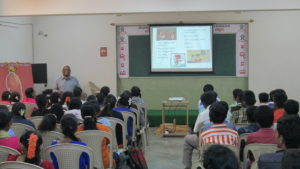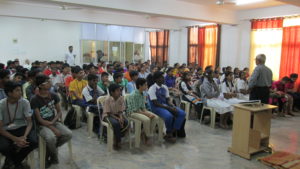Counseling Session on how to handle exam stress by Dr C R Chandrashekar, former professor of psychiatry NIMHANS on Feb. 2nd, 2019
 Dr C R chandarshekar interacted with 200 children and parents from socially deprived background and gave them several tips of how to succeed in exams, how to handle stress and also guided parents on their responsibilities towards students during exams. He said the main objective of any student is that after 25 years age they should be able to lead an independent and sustainable life. Aim of education is to help in getting a job, knowledge, skills , develop strong personality and live a meaning full and healthy life.
Dr C R chandarshekar interacted with 200 children and parents from socially deprived background and gave them several tips of how to succeed in exams, how to handle stress and also guided parents on their responsibilities towards students during exams. He said the main objective of any student is that after 25 years age they should be able to lead an independent and sustainable life. Aim of education is to help in getting a job, knowledge, skills , develop strong personality and live a meaning full and healthy life.
He asked the students not to believe in fate and instead believe on hard work and effort. Exam fear is among many children and parents. May parents worry as they have to pay high donations if students gets less marks. Even teacher fear exams as it affects their career prospects. He gave an illustration of uneven competition for 8 lak plus students appearing for SSLC exam, by showing a test where and elephant to squirrel compete equally. IQ level is not same for all the students yet they compete together. 15% of students have IQ level below 75 , 70% students have IQ level from 75-110 and 15% students have IQ level above 111. According to him IQ depends on the nature of food starting from the womb and circumstance where students grow. IQ is not static it can increase or decrease depending on effort.
 Some students have specific learning deficits like difficulty in understanding math and science. Parents force the children to take up science in PUC though the students gets less marks in SSLC. Students should instead be encouraged to take up arts in PUC and in degree and later try for various competitive exams. A person can still prosper in life by not taking up science related subjects. If a student has some disability they can get it diagnosed and write to the SSLC board where provisions exist for some exemptions.
Some students have specific learning deficits like difficulty in understanding math and science. Parents force the children to take up science in PUC though the students gets less marks in SSLC. Students should instead be encouraged to take up arts in PUC and in degree and later try for various competitive exams. A person can still prosper in life by not taking up science related subjects. If a student has some disability they can get it diagnosed and write to the SSLC board where provisions exist for some exemptions.
He asked students to help their friends who are weak in a subject and help them to at least pass a subjects by combined learning. It is good to succeed and help other also come up.
Learning is about registration, recording and recall. He asked students to pay attention so that the sense organs like ears and eyes can take the needy information to the brain. Practising by writing helps in registering the information and recalling. One Time writing is equivalent to ten times reading. Recall the subject as many times as possible as memory improves.
He also explained the anatomy of the brain. Image recording is done at the back, sound is recorded as the side called as the temporal lobe. We learn by seeing listening and doing and different parts of the brain are involved in each of theses.
Factors which helps in learning are pleasant mind, comfortable environment, motivation to learn and good study hobbits. He asked parents keep away the students from TV, mobiles, family fights. Primary and Middle schools children study due to parents instruction, whereas SSLC students have to study by self-motivation which can be brought realisation that they can lead better lives if they study well. He asked students not to have any sort of fear, worry, sadness, anger, frustration while studying. He asked the students to control all their desires and wants for 1.5 months.
To stay relaxed he asked students to listen to music, do yoga, pranayama, take deep breath and practise omkara . Students should not stop their hobbies during exams. 30 minutes of the hobby daily helps a lot to relax the body and mind. Stay satisfied with food and clothes and have contentment. Studying as per the biological clock helps a lot. Five hours after sun rise the body has very high energy level which drops later. Students should never do late night study and asked both parents and students to sleep at 10PM. Late night study reduces memory.
The different types of reading are silent reading, loud reading, and combined reading. Each has its own advantages. Silent reading helps to read fast. Lod reading will engage the ear . Combined reading helps interaction. He asked the student to practise all three during exam time.
The process of learning is to read, understand, recall and relax. Studying for long hours is not good. He asked students not to study for ore than 20 minutes at a stretch. He asked students not to read the same subject instead read different subjects as the used different parts of the brain.
More than 40% of the children have anaemia. If students feel tired often they should get diagnosed for low haemoglobin level.
Many youngsters are addicted to mobile , Facebook and whatsup. He asked students to stay away from these during exams.
He told there is no tonic to improve the memory.. Instead medications are available for anxiety, depression and other factors which affects the student.
Cause of exam fear is competition, big targets and anticipating failures. Try to control fear by being positive and not worrying much. He asked students to go step by step.
He asked students also explore learning some skills, think or career in sports or music etc.
Stay physically and mentally fit, socially adjust to others, avoid junk and to much fried foods. Because to make food attractive lot of artificial flavours and artificial colours are added. Mothers or grandmothers food is the best healthy food.
Success depends on Persistence, handwork, education, failure, sacrifice, discipline, dedication . Some commit suicide or run away from home due to disappointment. He asked students to have hope and if they fail now they can succeed later and not loose hopes. He asked parents not to scold the students after the results are out, instead to support them.
The program was followed by distribution of book freely to all the children which is authored by Dr CR Chandrashekar himself.
